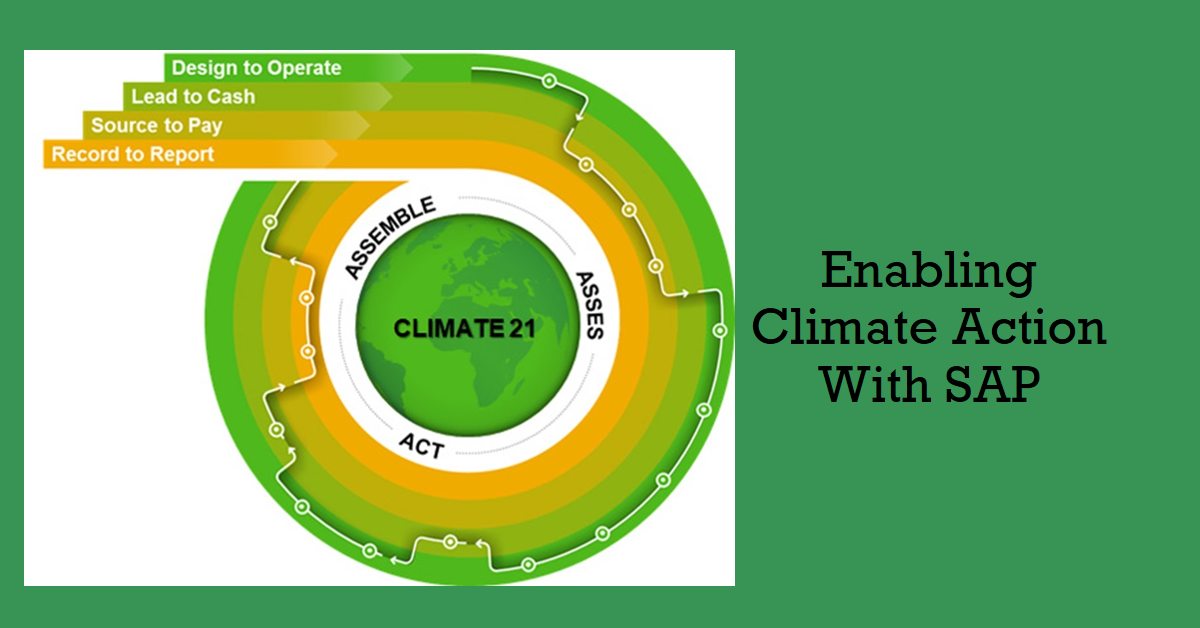
SAP as an Enabler for Climate Action
Sustainability today is a core business imperative. It is a challenge for the world, and a challenge for all companies. Without a healthy planet, there is no basis for long-term growth and prosperity. Tackling climate change requires efforts from all of us, as not one company can make an impact alone. As a role model SAP launched the Climate 21 initiative to tackle this biggest challenge of the 21st century. SAP is enabling a low-carbon economy and aim to help companies to manage the top line and bottom line of their business. Main objective here is to help companies manage their green line by minimizing the carbon footprint and negative environmental impact of their product.
Need to initiate a Climate Action
Shift in Markets: Consumers are shifting to more sustainable products and services. Investors are demanding information about Climate Strategy. Employees stay with company which serves a cause they value.
Redefining Environmental Responsibility: Climate action was highlighted in Davos world economic forum. At least a 50% reduction in CO2 needed over the next 10 years. Moving to net zero requires corporate leadership, teamwork, and innovation.
Businesses will benefit from Climate action : Companies that lead the way in addressing climate change over the next 20 years will not only directly reduce emissions, but will also gain the credibility and reputation to invite employees, customers and suppliers to follow them based on their performance, innovative work or the products and services they offer.
SAP’s Role as a sustainability enabler
With 77% of the world’s transactions touching SAP systems and more than 400,000 companies using SAP software, there are both the opportunity and responsibility to deliver digital solutions that enable customers to manage their own and the planet's limited resources productively and contribute to a sustainable economy and shape a sustainable future.
At the beginning of 2020, SAP launched the strategic program, Climate 21, to enable companies to take climate action and minimize the greenhouse gas footprint of their products and operations.
Core principles of Climate 21
Core principles of climate 21 includes carbon accounting, emission reduction strategies, and sustainable business practices. SAP's vision is to support standardized metrics around processes, analysis, and reporting to enable companies to embrace sustainability in all business functions.
SAP addresses sustainable business with a holistic offering that provides insights across the entire value chain. It includes creating transparency on data, insights, and steering options to help customers to understand their impact and change their business models towards a more climate-friendly portfolio. SAP Sustainability Product Footprint Management helps companies quickly get the full picture of their carbon footprint at scale with calculations that integrate supplier data and existing business data.
Leveraging Technology to Drive Sustainable Impact : Climate action can be tackled with technology, and SAP has introduced it as a new dimension in its solutions. Digital technologies such as IoT or artificial intelligence can enable real-time monitoring that allows companies to measure energy consumption and use the data for things like carbon accounting calculations. SAP Business Technology Platform plays a significant role in sustainability at SAP.
SAP is to build analytical and transactional capabilities into the enterprise applications that can help customers understand and minimize the greenhouse gas (GHG) footprint of their products and operations along their value chains.
Conclusion
SAP is a key driver in the sustainable transformation of businesses. SAP’s portfolio of advanced solutions enables customers to meet their sustainability challenges and opportunities. The inclusion of a company-wide strategy for CO2 reduction, through a solution like Climate 21, will assist enterprises to become more transparent and environmentally conscious. It will help to create intelligent organizations that decrease CO2 throughout the complete supply chain from beginning to end. It assists organizations of any size or industry to monitor their environmental footprint accurately, comply with in-place environmental guidelines, and make informed decisions for sustainability.